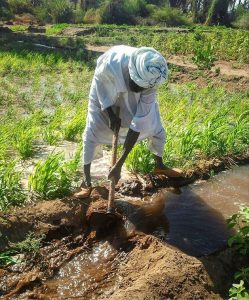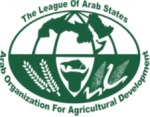by Claudia Ringler, and Stefan Uhlenbrook
Africa leads globally with population growth and Sudan is no exception. Between 2020 and 2005, the country’s population is projected to double to 80 million people, and a further 60 million people will be added by 2100. Despite the rapid growth of urbanization, projected to grow from 35% to 53% in the next 30 years, Sudan’s rural population is expected to increase by 10 million by 2050. It will be important to generate jobs for the bulging rural and urban youth in the country, while also increasing labor productivity.
Climate change, civil conflicts and food insecurity are interlinked and Sudan is a country where these three forces have reinforced each other for far too long, leaving the country with a range of food insecurity and nutrition challenges. In 2017, close to 40% of children were too short for their age, up from 34% in 2012. Numbers are higher than they were 30 years ago, according to UNICEF Sudan. This makes Sudan one of the few countries where stunting trends have moved in the wrong direction in Africa.

Similarly, in 2017, 16% of children were affected by wasting. Other indicators that need urgent changing include that 10 million Sudanese were undernourished in 2015-2017, that is around 25% of the population and that close to one third of women of child-bearing age were anemic in 2016. High levels of stunting not only have direct impacts on physical development, but often also have irreversible impacts on lifetime cognitive and learning abilities that can result in large costs to national economies. It is unlikely that these indicators have improved during the close to two years of the Covid-19 pandemic. Can we bend this curve?
Can Water-Energy-Food-Ecosystem Health Nexus solutions help reverse some of these growing challenges? Cross-sectoral coordination starts at the national level. While a few years old, a 2017-e-survey of key agencies involved in supporting water, energy and food security noted that across three Eastern Nile countries agencies agreed that coordination should be strengthened across government agencies in countries, as well as across agencies across the region. For Sudan, this means that the Ministry of Agriculture and Natural Resources, the Ministry of Irrigation and Water Resources, the Ministry of Livestock and Fisheries, and the Ministry of Energy and Oil should coordinate to jointly identify and implement rural growth and national food security and nutrition strategies. Such strategies need to be supported by strong investment in agricultural R&D; but investment in agricultural R&D is unlikely to pay off unless it is paired with aligned investment in water and energy infrastructure. Clean energy avoids competition between domestic and productive uses of energy (i. e. use of wood or cow dung as fuel for cooking or to support agriculture). Energy to lift water, mechanize production and to nourish crops is essential for agricultural intensification, but also for livestock rearing, a key livelihood strategy in the Sudan. And electrification is a potential catalyst of supply chain development for nutrient-dense but highly perishable irrigated crops. Accelerating clean energy access, including a solar revolution in Africa, including Sudan will be essential to improve rural livelihoods, create on- and off-farm jobs and to produce more and more nutritious food. Access to clean energy for all reduces pressure on deforestation which in turn affects agro-ecosystems, reduces women’s time use to collect fuel and—through affecting climate change—everyone on the globe.
However, access to clean energy, without a coherent policy framework and enabling environment, can lead to further environmental degradation, such as unchecked irrigation development, groundwater depletion, and overapplication of chemicals. Such a framework and enabling environment as well as the monitoring of key natural resource variables need to be provided by the government.
There is also a huge potential to improve rural water security, for example, through joint irrigation and rural water supply projects facilitated by increased dry-season flows from the Blue Nile. If national systems enable farmers to develop small-scale irrigation and also support them to use these flows wisely through proven irrigation management technologies and climate information systems, already tested in parts of Sudan, then food production could dramatically increase. For this to happen, it will be key to ensure that farmers as the key water stewards are in the drivers’ seat and that irrigation investment is not thought of an engineering enterprise but instead as a tool to achieve multiple, inter-related water, food, nutrition and environmental outcomes.
Suggested Nexus interventions that can improve food security and nutrition in Sudan include 1) seasonal weather forecasting to reduce yield losses and improved irrigation water use, ideally coupled with soil moisture monitoring in irrigated areas; 2) the use of biogas from cow manure as a fuel source for cooking, and investment in solar home systems to accelerate access to clean energy in rural areas; 3) accelerated investment in solar-irrigation with supportive governance of groundwater use to avoid groundwater depletion; 4) support to safe reuse of wastewater in (peri-)urban agriculture; 5) investments in rural multiple use water systems to support domestic and productive uses; and 5) investment in solar cold storage options for enhanced storage of milk and other perishables. Other investment solutions have been developed as part of the Nexus Dialogue Program.
Finally, while cross-agency coordination is essential at the national level in Sudan, there is no way around the need for improved coordination of Sudan with upstream and downstream countries given the country’s embeddedness in the Nile River System. Optimizing energy production, growing dry-season food production, growing rural water security and supporting important ecosystem function requires close collaboration across shared basins, watersheds and river flows. Many studies have shown that cooperation and coordination over shared water resources are important for national agricultural, water, and energy planning as well as for improved sharing of non-water resources.
Only if both national coordination around water, energy, food, and the environment is strong and regional cooperation strengthened, can we bend the curve on childhood stunting--through improved water, energy and food security, a tall but achievable order for Sudan’s Transition Government. CGIAR stands ready to support this knowledge-intensive endeavor.
Claudia Ringler is the Deputy Director of Environment and Production Technology Division at IFPRI
Stefan Ulhenbrook is a Program Director at the CGIAR Research Program on Water, Land and Ecosystems (WLE), and the Strategic Program Director on Water, Food and Ecosystems at IWMI
